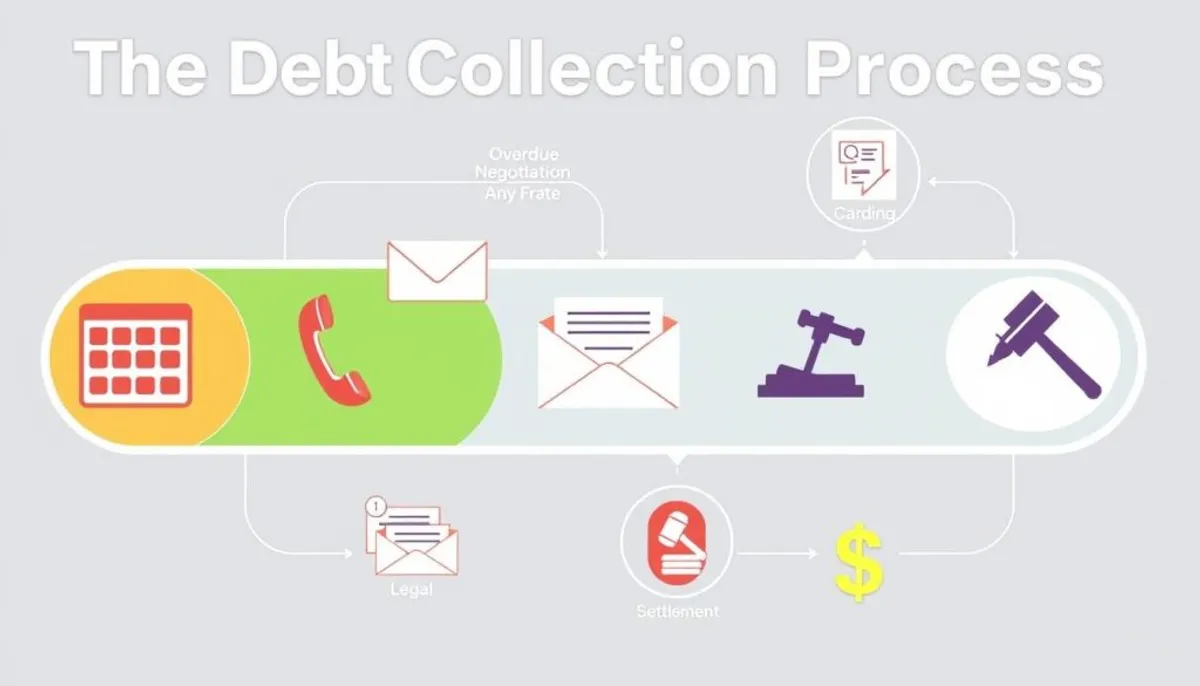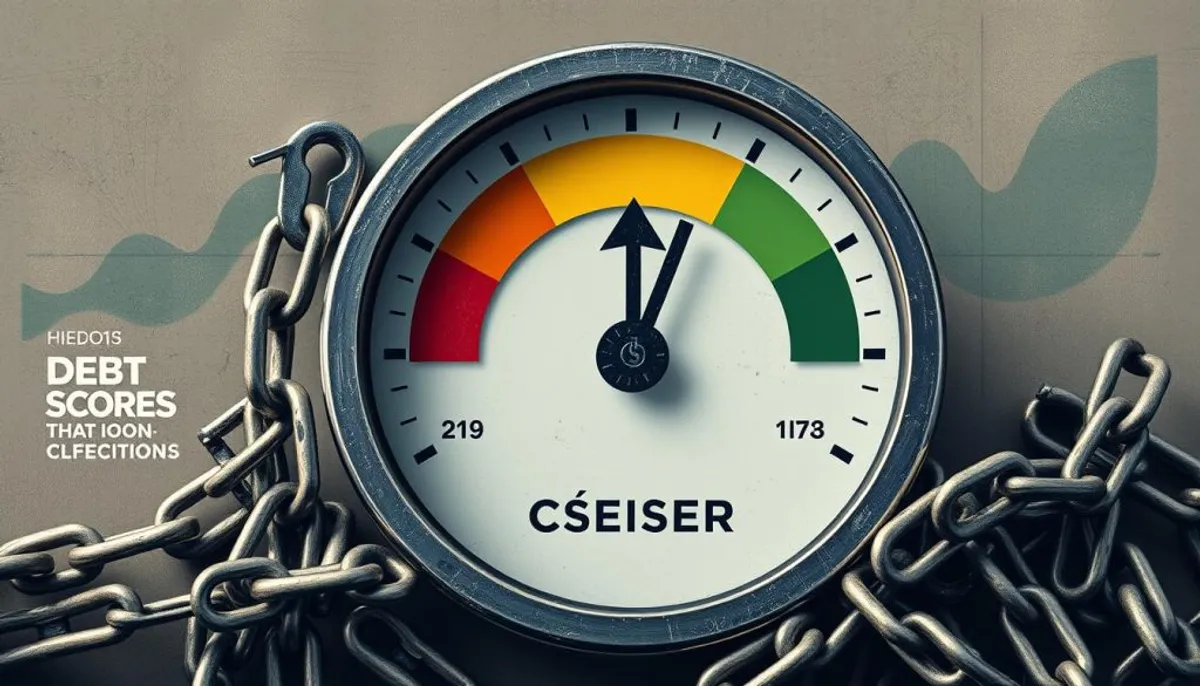Debt collection agencies are pivotal in the financial sector. They specialize in retrieving unpaid debts from individuals or businesses. Acting on behalf of creditors or purchasing debts outright, their objective is to collect the outstanding amounts.
These agencies manage a broad spectrum of delinquent debts. This encompasses credit card balances, medical bills, and unpaid utility charges. Their primary mission is to ensure payment for these overdue accounts.

Debt collectors frequently operate on a contingency basis. This arrangement allows them to earn a percentage of the recovered amount, typically between 25% and 50%. Some entities even acquire delinquent debts at reduced rates, aiming to profit from the full collection.
Grasping the mechanisms behind these agencies is vital for both creditors and debtors. It is essential to comprehend your rights and available options when engaging with debt collectors.
Key Takeaways
- Debt collection agencies recover unpaid debts for creditors
- They handle various types of delinquent debts
- Collectors often work on a contingency basis
- Some agencies purchase debts at discounted rates
- Understanding debt collection practices is crucial for both creditors and debtors
Understanding Debt Collection Agencies and Their Role
Debt collection agencies are pivotal in the financial world. They bridge the gap between creditors and debtors, aiming to recover outstanding debts. These entities employ diverse strategies to ensure effective debt recovery, all within legal and ethical frameworks.
Definition and Purpose of Collection Agencies
Collection agencies are dedicated to retrieving unpaid debts for creditors. They intervene when internal efforts fail, usually after debts are 60 days overdue. Their mission is to optimize debt recovery while adhering to regulatory standards.
Types of Debts Handled by Collection Agencies
Collection agencies manage a broad spectrum of debts, encompassing:
- Credit card balances
- Medical bills
- Personal loans
- Student loans
- Unpaid utility bills
How Collection Agencies Acquire Debts
Agencies obtain debts through two main avenues:
- Being contracted by creditors to collect on their behalf
- Purchasing delinquent debts directly from creditors at discounted rates
The decision to engage a collection agency hinges on the comparison of internal recovery yields versus outsourcing. Agencies earn a commission on collected amounts, influenced by factors like debt age and balance.
| Debt Age | Commission Rate | Recovery Difficulty |
|---|---|---|
| 60-90 days | 15-25% | Low |
| 91-180 days | 25-35% | Medium |
| 181+ days | 35-50% | High |
Collection agencies operate efficiently, leveraging specialized technology and trained personnel. This makes outsourcing debt collection financially viable for large creditors. It enables them to concentrate on their core activities while ensuring debt collection capabilities.
What Do Debt Collection Agencies Do: Core Functions and Services
Debt collection agencies are pivotal in the debt recovery process. They intervene when borrowers fail to meet their payment obligations, usually 60-90 days after the due date. These entities provide specialized services to assist creditors in retrieving outstanding debts.
Their primary objective is to engage with debtors. They employ a range of strategies, including:
- Phone calls
- Letters
- Emails
Collectors strive to convince debtors to settle their debts. They conduct asset searches to gauge a debtor’s capacity for repayment. This information is crucial for developing effective negotiation strategies.
When direct payment is unfeasible, agencies may propose payment plans or settlements. In extreme cases, they might resort to legal action to reclaim debts. It’s vital to acknowledge that reputable agencies adhere to the Fair Debt Collection Practices Act (FDCPA) guidelines.
| Service | Description |
|---|---|
| Skip Tracing | Locating debtors who’ve moved or changed contact info |
| Documentation | Maintaining records of collection efforts |
| Reporting | Providing updates to creditors on collection progress |
Collection agencies are remunerated based on a percentage of the recovered funds. This model motivates them to employ efficient debt recovery methods while adhering to legal standards. By utilizing these services, creditors can concentrate on their primary activities, entrusting the intricate task of debt collection to professionals.
The Legal Framework Governing Debt Collection
Debt collection is a regulated industry, with laws in place to protect consumers from unfair practices. The Fair Debt Collection Practices Act (FDCPA) forms the backbone of fair debt collection in the United States.
Fair Debt Collection Practices Act (FDCPA)
The FDCPA sets clear guidelines for debt collectors. It prohibits contact before 8 a.m. or after 9 p.m. and limits calls to three times a week. Collectors can’t use social media to post about debts publicly. If a lawyer represents you, collectors must talk to them, not you.
State-Specific Collection Laws
Most states have their own laws that mirror the FDCPA. These laws may offer extra consumer protection. For example, some states restrict when and how often collectors can contact you at work.
Consumer Protection Regulations
Consumer protection laws give you rights when dealing with debt collectors. You can dispute incorrect debt information under the Fair Credit Reporting Act. Collectors must include this dispute in their credit reports.
| Collector’s Rights | Consumer’s Rights |
|---|---|
| Demand full payment | Dispute inaccurate debt |
| Contact credit bureaus | Limit communication times |
| Seek debtor’s location | Request attorney representation |
Understanding these laws helps protect your rights and ensures fair treatment in debt collection processes.
The Debt Collection Process Step by Step
The debt collection process is a systematic method employed by collection agencies to reclaim unpaid debts. It is essential for both debtors and creditors to comprehend these steps to better navigate the process.

Collection agency procedures initiate when a payment is 30 days overdue. At 60 days, creditors may escalate their actions, including reporting the debt to credit bureaus. If the debt persists unpaid, it is often sold to a collection agency at a 30-35% discount of the total amount owed.
Here’s a detailed overview of the debt collection process:
- Initial contact: The agency dispatches a debt validation letter within five days.
- Communication attempts: Collectors employ various methods to contact the debtor.
- Negotiation: Upon successful contact, the collector outlines the debt and endeavors to secure payment arrangements.
- Dispute handling: If the debtor contests the debt, the collector must furnish verification.
- Continued efforts: The agency may report the debt to credit bureaus or initiate legal proceedings if payment is not forthcoming.
It is imperative to note that the Fair Debt Collection Practices Act restricts collectors from contacting consumers before 8 a.m. or after 9 p.m. Debtors should be informed that a collection account can stay on their credit report for up to seven years from the date of delinquency.
| Time Frame | Action |
|---|---|
| 30 days past due | Collection process typically begins |
| 60 days past due | More aggressive creditor actions |
| 120-180 days of non-payment | Creditors may charge off the debt |
Methods and Techniques Used by Debt Collectors
Debt collectors employ a variety of debt collection techniques to reclaim unpaid balances. These strategies aim to optimize recovery while adhering to legal standards. Let’s examine the primary approaches utilized by collection agencies.
Communication Strategies
At the core of debt recovery efforts lies effective communication. Collectors engage debtors via phone calls, letters, emails, and sometimes text messages. They must adhere to the Fair Debt Collection Practices Act (FDCPA), which prohibits harassment and ensures fair treatment of debtors.
Skip Tracing and Debtor Location
Skip tracing is a critical technique employed when debtors alter their addresses or contact information. This involves searching public records, databases, and social media to pinpoint individuals. It’s a vital skill for debt collectors, enabling them to maintain contact with debtors who might evade detection.
Documentation and Record Keeping
Accurate documentation is crucial in debt collection. Collectors meticulously record all communication attempts, payments received, and agreements reached. This practice not only tracks progress but also ensures legal compliance.
| Debt Collection Method | Description | Effectiveness |
|---|---|---|
| Phone Calls | Direct contact with debtors | High |
| Letters | Written communication detailing debt | Medium |
| Emails | Digital correspondence | Medium |
| Skip Tracing | Locating debtors | High |
Your Rights When Dealing with Debt Collectors
Understanding your debtor rights is paramount when confronted with debt collectors. The Fair Debt Collection Practices Act (FDCPA) safeguards consumers from unfair treatment. This legislation delineates the limits for debt collection agencies, ensuring practices are fair.
Debt collectors must uphold your privacy. They are prohibited from contacting you before 8 a.m. or after 9 p.m. without your consent. They are also restricted to seven calls per week regarding a specific debt. Any form of harassment by debt collectors is deemed illegal.
You possess the right to dispute a debt within 30 days of receiving validation information. Failure to do so within this timeframe implies acceptance of the debt’s validity. It’s important to note that collectors can only communicate with you, your spouse, or your attorney regarding your debt.
| Right | Description |
|---|---|
| Debt Validation | Request written proof of the debt within 5 days of initial contact |
| Communication Limits | No calls before 8 a.m. or after 9 p.m. |
| Workplace Protection | Collectors can’t contact you at work if told not to |
| Legal Action Notice | Must be informed if a lawsuit is filed against you |
In the event of rights violations, filing a complaint with the Consumer Financial Protection Bureau is an option. They generally respond within 15 days. It is crucial to remain informed and protect yourself against unfair debt collection practices.
How ti3 Revolutionizes Debt Collection
In a world where 49% of U.S. invoices become overdue, businesses face a pressing need for innovative solutions to manage their cash flow. ti3, a pioneering SaaS platform, is revolutionizing the automated debt collection landscape.
Automated Payment Reminders
ti3’s automated system sends timely reminders to debtors, significantly reducing the 14 hours companies typically spend each week chasing payments. This feature enables businesses to recover debts more swiftly, addressing the reality that 60% of invoices are less likely to be paid after 90 days.
Streamlined Collection Process
The platform’s streamlined approach to debt collection markedly enhances efficiency. Given that 89% of small-to-medium businesses report late payments hinder growth, ti3’s automated debt collection process offers a cost-effective alternative to traditional agencies that can charge up to 50% in fees.
Maintaining Positive Client Relationships
ti3’s client relationship management features enable businesses to maintain good rapport with customers while effectively managing overdue accounts. This balanced approach is critical, as 66% of small business owners experience decreased mental health due to financial anxiety linked to unpaid invoices.
| Feature | Benefit |
|---|---|
| Automated Reminders | Reduces time spent on payment follow-ups |
| Streamlined Process | Improves debt recovery rates |
| Client Management | Maintains positive business relationships |
By leveraging ti3’s innovative SaaS platform, businesses can effectively tackle the challenges of debt collection while fostering positive client relationships.
Impact of Collections on Credit Scores
Collection accounts can significantly affect your credit score. They appear on credit reports after 180 days of missed payments. This can lead to a substantial decrease in your credit score, potentially by several points.

Duration of Collections on Credit Reports
Collection accounts can remain on your credit report for up to seven years from the initial delinquency. This prolonged duration makes credit repair after collections challenging. Yet, the negative impact diminishes over time.
Credit Score Recovery Strategies
To lessen the credit score impact of collection accounts, consider these strategies:
- Pay off debts promptly
- Negotiate pay-for-delete agreements
- Wait for collections to age off your report
- Maintain good credit habits
Recent changes in credit reporting offer some relief. Paid medical collection debts and those under $500 are no longer reported. Newer FICO Score models also disregard paid collections, which can improve your score.
| Collection Type | Reporting Status | Impact on FICO Score |
|---|---|---|
| Paid medical debt | Not reported | No impact |
| Medical debt under $500 | Not reported | No impact |
| Paid collections | Reported | Disregarded in newer models |
| Unpaid medical debt over $500 | Reported after 1 year | Reduced impact in newer models |
By grasping these factors and applying effective strategies, you can strive to enhance your credit score despite collection accounts.
Debt Validation and Dispute Processes
Debt validation is a critical phase in the collection process. Upon initial contact, debt collectors must dispatch a debt validation letter within five days. This document details the debt amount, the creditor’s identity, and your right to dispute the claim.
As a consumer, you have a 30-day window to request debt verification or dispute the debt. During this period, the collector must halt collection activities until they furnish proof. This step is vital for verifying debt accuracy and safeguarding against paying for debts that are not owed or have expired.
To initiate the dispute process, submit a written request for verification. The collector must then present evidence of the debt’s legitimacy. This evidence could include account statements or the original credit agreement.
It’s important to note that if you fail to dispute the debt within 30 days, it is considered valid. Yet, you can still contest it later. If the collector cannot verify the debt, they must cease collection efforts and remove it from your credit report.
Debt verification is a consumer’s right under the Fair Debt Collection Practices Act. It serves as a powerful tool to defend against unfair collection practices and ensure the accuracy of claimed debts.
Negotiating with Debt Collectors
Engaging with debt collectors can be overwhelming, yet understanding your rights and alternatives can lead to positive outcomes. Let’s examine effective methods for negotiating with collection agencies.
Settlement Options
Debt settlement typically involves a single payment that is less than the total debt owed. Collection agencies often accept 25% to 50% of the debt, as they purchase debts at a fraction of their value. Some may settle for as little as 20%, while others might demand up to 80%. It’s essential to negotiate calmly and present detailed documentation.
Payment Plan Arrangements
If a single payment is unattainable, consider a payment plan. These plans allow for smaller, regular payments over time. It’s vital to ensure the plan doesn’t hinder your ability to cover essential expenses like rent and groceries. Any agreement must be in writing.
Debt Resolution Strategies
Effective debt resolution encompasses more than just negotiations. Consider these strategies:
- Debt consolidation
- Credit counseling
- “Pay for delete” arrangements
- Partial payments marked as “paid” on credit reports
The Fair Debt Collection Practices Act (FDCPA) safeguards consumers. Collectors must provide a debt validation letter within five days of initial contact. You have 30 days to dispute any inaccuracies. During this time, collection activities must cease if you dispute the debt.
| Strategy | Potential Outcome | Consideration |
|---|---|---|
| Lump Sum Settlement | 25-50% of total debt | Immediate resolution |
| Payment Plan | Full amount over time | Manageable monthly payments |
| Pay for Delete | Potential credit report removal | Not guaranteed by all agencies |
Avoiding Debt Collection Scams
Debt collection scams are on the rise, posing a significant risk to consumers. It is essential to recognize and evade these fraudulent schemes to safeguard your financial well-being and personal data.
Red Flags to Watch For
Be cautious of collectors who are evasive about the debt’s specifics or employ coercive tactics. Legitimate debt collectors provide detailed information about your debt and do not threaten immediate arrest. Scammers frequently request untraceable payment methods, such as gift cards or wire transfers.
Verification Procedures
Always verify the debt and the collector’s identity before making payments. Request written validation of the debt and investigate the collection agency’s legitimacy. Remember, real collectors can only contact you between 8 a.m. and 9 p.m. local time.
Reporting Fraudulent Collectors
If you suspect debt collection fraud, report it to the Federal Trade Commission, Consumer Financial Protection Bureau, or your state attorney general’s office. Keep detailed records of all communications with suspected scammers to strengthen your case.
- Check your credit reports regularly at AnnualCreditReport.com
- Contact the original creditor to confirm the debt’s validity
- Place a fraud alert with major credit reporting agencies if targeted
By staying vigilant and adhering to these guidelines, you can shield yourself from falling prey to debt collection scams and fraudulent collectors.
Conclusion
Understanding debt collection is essential for effective debt management. The U.S. is home to over 7,000 agencies, each playing a vital role in the financial ecosystem. These entities acquire debts at a fraction of their face value, striving to recover funds within legal boundaries.
Consumer rights are paramount in debt collection practices. The Fair Debt Collection Practices Act, enacted in 1978, protects individuals from unfair treatment. It’s crucial for consumers to be aware of their rights, such as the restriction on collection calls to seven times in seven days. This awareness empowers individuals, enabling them to make informed decisions regarding their debt.
For businesses, outsourcing debt collection can be transformative. Professionals in this field can enhance recovery rates by 10% to 30% and reduce costs by 20% to 40% compared to in-house efforts. Leveraging industry expertise and advanced techniques like skip tracing, which increases debtor location chances by 40% to 60%, agencies offer invaluable services in debt collection.
In summary, a detailed debt collection overview highlights a complex yet regulated industry. It balances the interests of creditors with robust consumer protections, aiming for fair and effective debt resolution. Whether managing personal debt or seeking to recover funds for a business, grasping these processes is vital for successful financial navigation.
RelatedRelated articles



